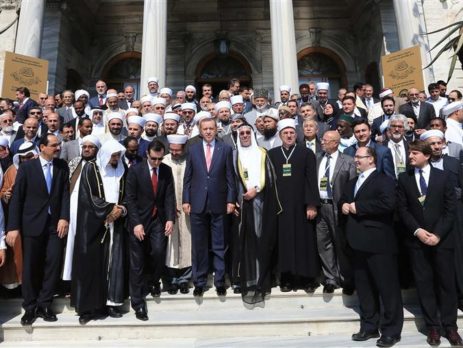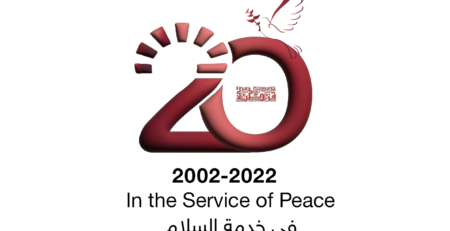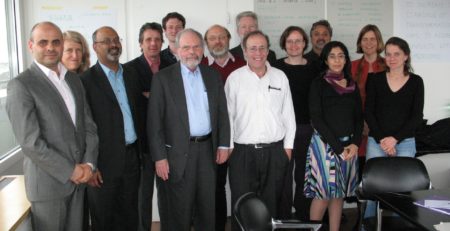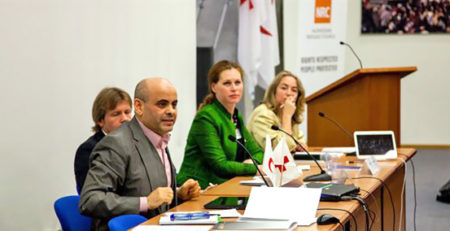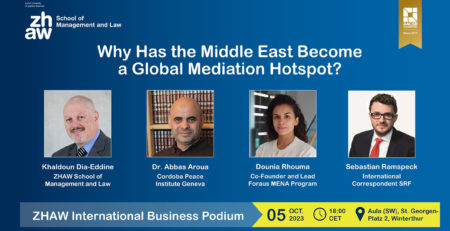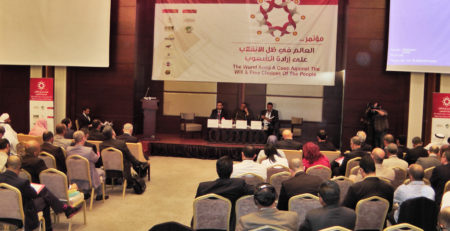World Islamic Scholars Initiative for Peace, Moderation and Common Sense
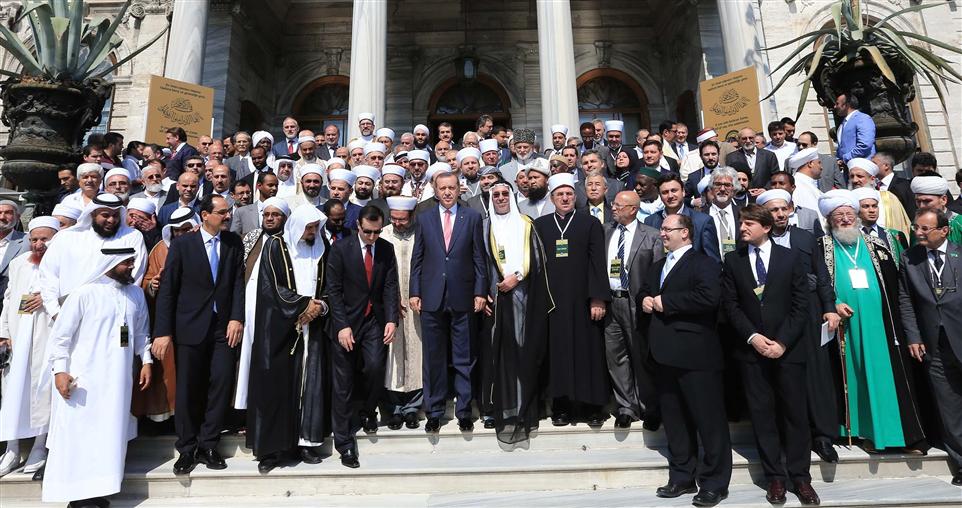
ANNOUNCEMENT
Unfortunately, the Islamic world is experiencing one of the hardest times in its history as we start marking the month of Ramadan. We should be experiencing salutations and tranquillity in the month of Ramadan and yet we find ourselves in the midst of a storm of division, violence and conflict that has no religious or historical basis.
The utter words that cannot stop the bloodshed is as meaningless as it is insufficient to observe the events in Iraq and Syria with great concern. A fatwa that will be the reason for the bloodshed has no religious basis and deserves to be rejected. In view of this situation, the prior duty that befalls on the scholars and wise men of the Islamic world should be to secure the immediate halt of the conflict and violence. As a matter of fact, the response we have received to our recent appeal for common sense by the scholars and wise men of the Islamic world for the creation of an initiative with broad participation has created great hope and excitement among us.
Inspired by these feelings and views we will be holding a conference and iftar dinner program titled “World Islamic Scholars Initiative for Peace, Moderation and Common Sense” between 17th – 19th July, 2014 in Istanbul, together with the Islamic scholars and wise men representing Muslims throughout the world including the representatives of religious institutions and establishments in the hot conflict areas, within the peaceful and compassionate month of Ramadan, to voice our calls for tranquillity and salvation to the world on the bases of cohabitation ethics and laws as well as to start efforts to find solutions based on religion and morals.
Prof. Dr. Mehmet Görmez
President of Religious Affairs of Turkey
{slider=Final Communique}
{pdf}images/pdf/istanbul-jul2014/FinalStatement.pdf{/pdf}
{/slider}
WE MUST FOLLOW THE PATH OF PEACE AND UNITY
Sunnis and Shiites believe in the same creator and follow the example of his messenger, Prophet Muhammad. We have more in common than differences.
Recep Tayyip Erdoğan
Recent developments in the Muslim world have led to a heightening of tensions between Sunnis and Shias. In Iraq, Syria and elsewhere, extremists have gone so far as to kill each other in the name of Islam. Those who declare other Muslims apostates and kill them in the name of the Sunni or Shiite sects are violating the basic principles of Islam. These are acts of barbarism and must be condemned by all Sunni and Shiite Muslims.
Islam rejects extremism of all forms. It also rejects violence and terrorism. Islam teaches us moderation and urges us to be balanced and proportionate in our actions. The Quran refers to Muslims as “the community that takes the middle path” (ummatan wasatah) beyond all extremism. It urges Muslims to uphold peace, justice and equality for all.
Contrary to the claims that Islam espouses violence and extremism, Islam literally means peace. It teaches us to be at peace with ourselves, other human beings, the natural environment and God, the Creator of all beings. This peace is achieved through faith, virtue and good deeds.
This is what it means to be a believer. “Muslim” literally is one who has achieved peace through submission to God and by conforming to universal moral principles. Therefore, those who shed the blood of innocent people are violating the most fundamental principles of the Quran and the sunnah.
Sunnis and Shiites believe in the same Creator and follow the example of His messenger, Prophet Muhammad. These two sects have more in common than differences and disagreements. We all turn to the same qibla, the Kaaba, when we pray. We all believe in the same principles of justice, peace, mercy and unity. We all believe that after we die we will be resurrected and held accountable for our actions in this world.
Sunnis and Shiites have lived together for centuries. The historical and legal differences between them cannot be a ground for communal violence, extremism and terrorism. Sunni and Shiite scholars, scientists, philosophers, poets, spiritual guides, artists, traders and community leaders have worked together for the common good of humanity and contributed to Islam’s great religious and cultural heritage. This heritage has been emulated by other cultures and societies and provided an example of religious and cultural pluralism and coexistence.
All Sunnis and Shiites should remember and work to revive this heritage to address their current problems today. Political, religious and community leaders should play a leading role in bringing people closer to one another and teach them the fundamental values of peace, unity and mercy as prescribed by the two holy sources of Islam. We should all stand united against extremism, violence and terrorism that violate and dishonor our religion.
The political conflicts in Syria and Iraq have already claimed the lives of tens of thousands of innocent people. We as Turkey have made every effort to bring this bloodshed to an end. We continue to support people’s legitimate demands for freedom, justice and dignity. We opened our doors to more than one million Syrian refuges regardless of their religious, ethnic or sectarian background. We provide humanitarian assistance to people of different religions and sects around the world. We do this with a sense of moral and political responsibility.
It is clear that some people want to start a sectarian war in the Muslim world. They are provoking Sunni and Shiite communities in Iraq, Syria, Iran, Bahrain, Lebanon, Saudi Arabia, Yemen, Pakistan, India and elsewhere to attack each other’s mosques and schools. They are manipulating social and political grievances to incite people against one another. They are using old historical differences to create modern wars.
This is a great “fitna,” in other words, communal strife and chaos, and its aim is to sow the seeds of hatred and animosity among Muslims. All Sunnis and Shiites must stand against this sectarian fitna and work for peace and unity. There is no gain in any religious or sectarian fighting, except that our religion and our humanity will be lost. Sectarian conflicts will only exacerbate the existing problems of Muslim societies.
Instead of fighting against each other, Muslims need to fight against injustice, inequality, poverty, illiteracy, corruption and underdevelopment. We must turn our cities and countries into centers of learning, innovation, creativity and co-existence. We should see our differences as a source of enriching and empowering each other. We should remember why God created people differently: “O humankind! We created you from a male and female, and made you into peoples and tribes that you may know each other. Truly the most honored of you before God is the most pious of you.” (49:13)
Sunni and Shiite Muslims have the spiritual and material resources to live in peace and prosperity. All of them are entitled to equal representation, economic opportunity and political participation. We must not allow social grievances and political differences to be used by extremists to create havoc and bloodshed in our countries. Regardless of their political stance, economic status or country of origin, all Sunnis and Shiites around the world must uphold the principles of peace, unity and mercy.
This is what Islam teaches us. This is what our humanity requires of us.
Daily Sabah – 19 July 2014 – dailysabah.com
OUR FOREIGN POLICY IS AGAINST ANY KIND OF SECTARIANISM
Turkey’s foreign policy has been opposed to the sectarianism in the region. When confronted by Sunni leaders such as Mubarak and Gadhafi, or others like Assad and Al-Maliki, Turkey will always choose to be on the side of the people and justice.
Ahmet Davutoğlu
The inherent potential of sectarian division reasserted itself in our region through the new atmosphere in the aftermath of the invasion of Iraq in 2003. Aside from the painful period in Iraq, new conditions in Lebanon after Hariri assassination and the post- Arab Spring transformation in Syria have further highlighted sectarian rifts in the region. We are unfortunately entering a period in which people define themselves by their ethnic or sectarian identities, mainly due to the fully or partially dysfunctionalized state structures in some of our southern neighbors. We can gather clues on the origins of the contemporary problems in our region by examining the policies of colonial powers after the dissolution of the Ottoman Empire, as well as nation-building processes conducted by post-colonial polities.
Empires are multiethnic and multicultural by nature. Given the fact that our region used to be the cradle of the oldest civilizations and religions, it is only natural that people from a myriad of ethnic, religious and sectarian backgrounds dwell in this region we call the Middle East. As the former sovereign of this region, the Ottoman Empire was a political structure including many cultural elements in accordance with the cosmopolitan nature of the region. After dissolution of the Empire, this cosmopolitan aspect continued to live within the boundaries of various nation-states in differing shapes in a natural manner. We observe different ethnic, religious and sectarian elements in many nationstates of the modern Middle East in varying degrees. A nation-state may have citizens from different ethnic, religious or sectarian backgrounds. What matters is that these citizens should be bound to their countries through equal citizenship. In order to realize this, it is imperative for the administrations of these countries to treat their citizens equally by providing their political, economic and cultural rights without any bias due to their identities.
Even though it may appear politically lucrative at first glance to conduct domestic and foreign policies based on ethnic and sectarian identities, longterm social and political results of these policies cause far greater damages. In acknowledgement of this problem, we stood against sectarian divisions in our foreign policy and strived to develop our relations with countries that have different sectarian backgrounds despite the upsurge of regional sectarian divisions after Iraq’s invasion. During the last decade, many examples of our nonsectarian foreign policy can be observed in our actions toward Iraq, Iran, Lebanon and Syria. In this regard, the core of our policy is as follows: We asked the administrations of countries in our region to respond to the demands of their people.
In Iraq, there was an increasing risk of sectarian conflict since 2005. Turkey put bilateral and regional mechanisms in place to be able to tackle this risk. In order to be able to extinguish the threats emanating from Iraqi domestic tensions for our region and our country, we utilized our channels with different Iraqi groups to positively contribute to the formation of a domestic peace environment. In this context, institutional and personal relations were cultivated with various Sunni and Shiite groups. During visits to Iraq, all sectarian groups were contacted and none of these groups were excluded. Convincing Sunni groups to drop their initial refusal to participate in the political process in reaction to U.S. invasion and increasing Shiite activity was seen as an example of Turkey’s positive contribution in both Iraq and the region. During the Iraqi elections in 2010, Turkey continued to espouse a nonsectarian stance and supported political coalitions comprising different groups. The validity of our policy is better understood in the hindsight of the unfortunate conditions of sectarian division currently engulfing Iraq. The etnically complicated situation in Lebanon along with sectarianism in the country led us to pursue a non-sectarian policy. Lebanon had bitter experiences in the past due to the mismanagement of relations between different ethnic and sectarian groups comprising Lebanese society. The post-Civil War stability in Lebanon began to unravel after the 2005 Hariri assassination. In this process, the inherent sectarian divisions of the Lebanese society began to reassert themselves in a forceful manner. During the same period, Turkey continued its contact with different Lebanese sectarian groups in line with the importance of Lebanon’s stability for the region, and conducted efforts of mediation between different groups to overcome the crisis in forming a new cabinet in 2011. Political representatives from all sects were contacted in Lebanon similar to the policy pursued in Iraq.
We realized important bilateral and regional cooperative actions with Iran, one of the most important actors in our region. The 1979 revolution in Iran had a particular effect of effusing sectarian issues in regional policy discussions. The recent progress in the political, economic and social relations between the two countries can be considered as an important counter-example against the rhetoric of the Sunni-Shiite divide in our region. We also believe that Turkey, Iran and Saudi Arabia can play a very important role in preventing sectarian divisions in Iraq, Lebanon and Syria. We told our Iranian counterparts in our various meetings that Iran should play a constructive role in thwarting the sectarian clashes in our region. It is imperative for important regional countries such as Turkey, Iran, Saudi Arabia and Egypt to work together to prevent such clashes.
The course of Turkey’s relations with the Syrian regime during the 2000s is an indicator of our principles shaping our foreign policy away from ethnic and sectarian differences and based on political, economic and cultural interaction. In our relations with Syria, we always advised the Syrian administration to respond to the demands of their people, including different religious and sectarian elements. Despite various criticisms, we endeavored to foster good relations with the Syrian regime even as they were under difficult conditions and various isolations. Sectarian differences did not prevent us from developing good relations. However, as a part of the regime’s nonresponsive attitude to people’s demands in the aftermath of the Arab Spring and its determination of a narrow sectarian policy, Turkey’s pleas to consider people’s demands were abused by the Syrian regime and some other actors. Turkey’s policy approach toward ousted Sunni leaders such as Zine El Abidine Ben Ali, Hosni Mubarak and Moammar Gadhafi during the Arab Spring and other leaders like Bashar Assad and Nouri Al-Maliki is no different. In the case of all these leaders, Turkey always advised them to respond to the demands of their people.
Due to sectarian divisions which gained ground after the invasion of Iraq and was further kindled by the oppresive response against Syrian people’s demands, our region resembles a neighborhood ablaze. We drew attention to this danger in the absence of response to the people’s demands and invited regional countries to cooperate. Even though this fire is currently underway in our region, we should act together hand in hand with all people of the region and perform our common duty as the inheritors of a practice of coexistence dating back thousands of years to prevent further extension of this problem.
WORLD ISLAMIC SCHOLARS INITIATIVE FOR PEACE, MODERATION AND COMMON SENSE
Scholars have the responsibility of promoting common sense and justice in the Muslim community, and fostering unity and fraternity.
Mehmet Görmez
This meeting is not a diplomatic meeting that we are used to, where we exchange pleasantries and offer well wishes. This is not a symposium where we will be debating religious teachings and rulings.
I have to state with sorrow that it is also not a meeting where we will be discussing the Palestinian issue, the Kashmir issue, East Turkestan, Nagorno Karabakh, Arakan, Chechenia and the Gaza Strip. Unfortunately it is not a meeting where we will be seeking relief for the problems of our brothers and sisters living in these regions. I really would have liked it to be such a meeting.
Regrettably, at this meeting will discuss how mosques are being bombed while attackers chant “Allahu Akbar” (Allah is Great), how those who face Mecca to pray everyday have declared war against each other and how innocent people are being massacred by their brothers. At this meeting we will discuss the fighting in Baghdad, Mosul, Kirkuk, Rojava, Aleppo, Hama, Damascus, Tripoli and where we will execute the verse of the Quran, “Find a gathering that augurs well, orders kindness and prohibits evil. They will be the ones to lead to salvation” (Al-i Imran, 104) to stop the bloodshed.
In the past few years we have marked practically every Ramadan with pain, misery, bloodshed and tears. This Ramadan we are faced with extremely painful events that we cannot even mention. This is happening in all parts of the Islamic World, led by Iraq, Syria and Palestine, tormenting our hearts, ruining our iftar dinners and taking away the spiritual joy of fasting without even touching our hearts.
No Muslim believer can or should remain silent in the face of what is being experienced in our region today. Of course I know each one of you is involved in efforts to put an end to these pains. We are here today with the encouragement and support we received from you following our recent appeal. If it had not been for your encouragement and desire we would not have been here today.
If nothing results from this and similar meetings, if we cannot prevent Muslims from attacking one another and putting an end to the fighting and deaths, those who wield power due to the divided Islamic world will continue to attack the Gaza Strip which they have turned into an open air prison and rain their bombs down on innocent children, women and the elderly. And in many other regions Muslims will be left to die without any defense. I take this opportunity to strongly condemn the ruthless, remorseless and unsavory attacks on Gaza and wish Allah’s blessings for the martyrs and urgent recoveries for the wounded.
It should be known that the events in Iraq, Syria, Libya, Nigeria and other places, including murders, suicide attacks, the kidnapping of innocent girls, bombing of mosques, destruction of holy places and forcing millions of people out of their homes, do not only affect the people in these places but also strains the perceptions of Islam everywhere and is embarrassing to Muslims throughout the world. This is leading to the alienation and marginalization of Muslims in all regions where they are a minority. Muslims are face-to-face with having to live under threat, fear and alienation in the regions they live. The industry that is trying to create Islamophobia is pointing to the fighting and the scenes that are playing out in the Islamic world and conducting a relentless campaign against Muslims to spread fear about Islam. The damage that the ignorant Muslim followers have inflicted on the great religion of Islam is several times more devastating than the damage caused by the arch enemies of our religion.
Seeking reasons for current events only in the outside world will be the easy way out. It would be easy to blame other sects for their actions or to put the blame for all the events on the adversaries of Islam, on foreign enemies, evil forces, imperialists or Zionists. Seeking such plots may save the day for now. But those who really have any notion of responsibility should care to look inside their own fold, make an analysis and come up with evaluations. Creating empathy is one of the leading methods used to overcome such crises.
If we try to evaluate these events from the perspective of the social sciences, we should take into account all available data on poverty, ignorance and captivity, which are the products of occupations and colonialism in modern times and created wounded minds and fatal identities. These wounded minds and fatal identities are now trying to justify their hatred, anger, passions and desires for revenge under the guise of religion and sects.
Scholars are the conscience of the Muslims ummah and the inheritors of the prophets. Scholars have a great responsibility to represent the common sense of the Muslim community, to secure justice and to sustain unity and fraternity.
The relationship between science and politics is based on the fact that science provides guidance. Scholars have the duty to uphold unity, interests and affairs of Muslims at the forefront and defend the truth by taking risks for this cause. Policies that defend unity and interests of the Islamic nation are policies of scholars. These policies should aim to secure unity of thought, culture and actions on the part of Muslims. That is the only way scholars will be the inheritors of the prophet.
As Islamic scholars, when we talk about the rules and methods to follow during Hajj, we must tell all that massacring people and killing them is the same as murdering the whole of humanity.
When we explain to people the debate on sighting the crescent moon to mark the start of religious occasions, when fasting should start and what spoils fasting, we should also tell them that raining bombs on people fasting or performing the tarawih prayers, raining bombs on children, women and the elderly, will only ruin Islamic unity. Of course we will discuss when the fasting period starts.
Sects are the works of human beings that represent different views and opinions which have emerged in an effort to understand the Islamic religion. To equate sects with religion or to regard membership to a sect as superior to being Muslim is unacceptable. Conflict, discrimination and marginalization based on sect is a reflection of oppression and ignorance. It is religion that has suffered the most when sects have taken over religions. Considering sects to be akin to religions and forcing this upon societies has hurt the pluralist structure of Islam, thus destroying the notion of fraternity and culture of tolerance that existed at the crux of religion. Those who are different have been declared disbelievers. When a sect regards or tries to portray itself as the sole representative of religion, the result will be that it will exclude others from religion and accuse them of perversion or even with sacrilege. Under such circumstances unity and solidarity of the Islamic community is destroyed. Social peace is destroyed. No one can declare others to be nonbelievers because they do not practice Islam like them. No Muslim can regard another Muslim a polytheist and wage war against him or her.
Islam orders us to show mercy and compassion to all living creatures and approach them with affection. It is impossible to think that Islam condones shedding of blood and mass murders in the form of suicide attacks that target people indiscriminately. Jihad is the name of an exhilarant action and has nothing to do with terrorism and savagery. Today, the greatest jihad that Muslims should resort to is fighting against ignorance, oppression, sedition and discord. No one can justify the creation of new grievances through waging a so-called jihad against oppression. No one can try to justify oppression by creating a bloodbath through knowledge and fatwas.
Those who hold positions of authority and those who hold the riches in their hands in the Islamic world are in a position to act with the understanding that all material resources and riches belong to Allah and that these are given for safe keeping to be used for the benefit of the Muslim community. They do not have the right to use these riches in a selfish manner, for sectarian and ethnic oppression or in a monopolistic manner. They must act with justice.
No one has the right to continue ruling without the consent of the people, kill hundreds of thousands of people to remain in power and drive people out of their homes.
To keep a person alive is more important than an office, administration and reign. No person’s death can be justified by greed, passion and ideology.
You should not consider the religion and sect of the oppressed or the oppressor. You should open your arms and embrace the oppressed and the victim without asking their religion and sect. The moral of conscience also requires people to stand up to the oppressor irrespective of their religion or sect.
The values of reference for us Muslims have to be justice, solidarity, independence, peace, friendship, wisdom, rule of law and morals while we reject oppression, exploitation, occupation, war, repression, personal interests, piracy, and the dominant approach that relies on weapons and power.
Divine laws require individuals and communities to reconcile without fighting and preserve peace without resorting to war. What is incumbent on us is preventing bloodshed irrespective of whose blood it is and where it is. We have to divert all our energy for this.
The basic paradigm of the legal norms in Islamic civilization has been built on five basic elements. They are the preservation of religion, intelligence, property, affiliation and life. So the life, affiliation, intelligence, property and religion of each person are sacred and have to be secured.
As Muslim societies we are part of a deep rooted civilization with a vast historical experience. We are going through a period of interim which has been experienced before. The miseries that this interim has created should not lead to hopelessness. This period is accidental and will pass away. The days when things will look up for Muslims, when stability and calm will prevail is not far off.
Let us regard sedition as worse than war and make a joint effort to eradicate sedition from the face of the earth. Let us work on sending messages of peace instead of working on the strategy of conflict and turn our region into a land of peace. Let us build the rules of living together based on peace. Let us spread the appeal we will make here all over the world. Let us form a delegation of wise men and turn our appeals into action. Let this delegation help halt the fighting and prevent Muslim blood from shedding blood and help restore peace and well-being in Muslim cities.
The eyes of the Muslim community are on us. The nation of Muhammad is listening to us. The hands of the oppressed and the helpless are at our throats. If we remain silent to the cruelty, if we fail to stop terrorism while the blood of our martyrs stains our cloaks it will be written down on our divine books as a sin that we will face on judgment day.
I wholeheartedly invite everyone to join our appeal for common sense and pray to the Almighty that we will not be embarrassed for our deeds on earth on Judgment Day and turn us into people who perform good deeds with the notion of being aware of their duties.
OVERCOMING SECTARIANISM
The legacy of imperialist interventions, failed states, poverty, illiteracy and the sence of dispossession and alienation has created deep wounds in the region. While Sunni and Shiite extremists fight for domination, the real objective should be justice, equality and dignity.
Ibrahim Kalın
Senior Adviser to the Prime Minister of Turkey
The new proxy wars in the Middle East are using sectarian identities as a smoke screen for narrow political agendas. Extremists are manipulating past grievances to start modern wars. What is reassuring is the fact that the vast majority of Sunni and Shiite Muslims do not consider themselves to be soldiers of a sectarian war.
Ahl us-Sunna and Ahl al-Bayt are two branches of Islam that originate from the same source. The followers of Sunni and Shia Islam worship the same God and believe in the same prophet. They turn to the same qibla to pray. They believe in the same principles of testimony (shahadah), prayer (salah), fasting (sawm), almsgiving (zakah) and pilgrimage (hajj). They uphold the same moral principles of justice, mercy, trust, steadfastness, forgiveness and unselfishness.
Their methodological and hermeneutic differences have only enriched and deepened the Islamic intellectual tradition. The Jafari school of jurisprudence established by the sixth Shia Imam Ja’far al-Sadiq (d. 765) has been a source of law for both the Hanafi and Shafi’ee schools. Muslim philosophers including al-Kindi, al-Farabi, Ibn Sina, Ibn Rushd, Nasir al-Din al-Tusi and Mulla Sadra have conversed about philosophical issues without any regard to sectarian issues. In the 19th century, Sunnis and Shiites fought together against imperialism and colonialism. Jamal al-Din Afghani promoted the unity of Muslims beyond ethnic and sectarian allegiances.
This is not to deny the fact that Muslims have had their share of sectarianism before the modern period. But the recent revival of sectarianism poses a different set of challenges. The problem is neither simply theological nor social. It is taking on a deftly ideological and geopolitical dimension. Sectarianism among Sunnis and Shiites is increasingly becoming part of the new proxy wars in the Middle East and lending itself to manipulation and provocation on a global scale.
The legacy of imperialist interventions, failed states, poverty, illiteracy and the sense of dispossession and alienation has created deep wounds in the social and political landscape of the Middle East. A divisive political identity has become a powerful ideological tool.
In the name of religion, nationalism or anti-imperialism, political opportunists and extremists have used the longstanding grievances of ordinary people to advance their political goals. In the final analysis, this should be a political struggle for justice, equality and dignity. But the Sunni and Shiite extremists are fighting for a plainly secular goal: political domination. Whether in Iraq, Yemen or Pakistan, they are using religious arguments for a worldly prize. Those who fight and kill in the name of Sunni or Shiite Islam are violating the basic principles of their religion.
Not all communal conflicts are caused by religion or sectarian allegiance. Neo-sectarianism is mostly political and driven by a mixture of what Ibn Khaldun called “asabiyyah,” “group solidarity,” identity politics and power struggles. When misused, asabiyyah can lead to division and conflict rather than unity and creativity as Ibn Khaldun hoped the Muslim communities of his time would do.
Group identities, whether religious, ethnic or secular, are intertwined with a wide range of social, economic and political factors. Recognizing this complexity is vital for managing and overcoming sectarian tensions. Pitting Sunni ‘asabiyyah against Shiite ‘asabiyyah is wrong and dangerous. It makes neither Sunnis nor Shiites more prosperous or safer.
In the modern period, a number of attempts have been made to formally bring Sunnis and Shiites together. In 1959, Mahmud Shaltut, the Shaykh of al-Azhar University, issued a fatwa authorizing the teaching of Shia jurisprudence as part of al-Azhar’s curriculum. Ayatollah Burujardi, one of the most influential Shiite scholars of his time, reciprocated by doing the same for Sunni jurisprudence. Shaltut and Burujardi went beyond academic teaching and laid the groundwork for a serious dialogue between Sunnis and Shiites.
Ayatollah Khomeini, the leader of the Islamic revolution of Iran, supported Sunni-Shiite reconciliation efforts and did not consider the Iran-Iraq war in the 1980s a sectarian conflict. In February 2007, Ayatollah Akbar Hashemi Rafsanjani, the former president of Iran, and Yusuf al-Qaradawi, the influential Sunni scholar, appeared on al-Jazeera to call for an end to hostilities and fighting between Sunnis and Shiites. On March 3, 2007, King Abdullah of Saudi Arabia and Mahmoud Ahmadinejad, the President of Iran, pledged to work for the unity of all Muslims in Iraq, the Gulf and the larger Muslim world. Unfortunately, these efforts have not continued. In 2010, Prime Minister Recep Tayyip Erdogan visited the holy sites in the city of Najaf where he met Ayatollah Sistani and delivered a strong message of unity between Sunnis and Shiites.
Given growing sectarian tensions in Iraq, Bahrain, Lebanon, Pakistan and other places, more should be done to support Sunni-Shiite reconciliation. Political and religious leaders must stand united against sectarian extremism. Sunnis and Shiites should fight not against each other but against the common enemies of inequality, poverty, corruption, extremism and illiteracy. It is the religious and moral responsibility of all Sunnis and Shiites to uphold the principles of peace, unity and mercy as prescribed by the Quran and the Sunnah.
THREE METHODOLOGICAL FUNDAMENTALS CONCERNING THE ISSUE OF ISLAMIC UNITY
The Quran is a book that Muslims have in their hands, whether Shiite, Sunni or otherwise. There is no other Quran.
Jaafar Fadlallah
The Shia Sharia Islamic Institute
In this article I will concentrate on several points I consider necessary to move from the theoretical to the practical domain when dealing with Islamic unity. It also contains self-criticism of the methodology we resort to in our Ijithadi thought, within all our sects or when we assess the differences between various Islamic sects. These three points are:
(1) The intellectual reference:
All Muslims agree that the holy Quran is their juristic, doctorial and intellectual reference they refer to in order to solve differences among them. The Quran is the book that Muslims have in their hands, whether Shia, Sunni or otherwise. There is no other Quran. It is clear that the Quran has laid the basis for Islamic unity in a number of holy ayat such as:
“Hold tight to the covenant of God and do not disperse,” but some problems come from the acceptance of the Hadeeth without any standard reference. There are two issues to consider:
First, to what extent is the holy Quran present in our intellectual and doctrinal thought? And what will be the result of harmony between the Quran and Sunnah? The institution of the ayat refers to the Quran as the reference on which all our concepts and doctrines should be based, meaning that there is a wide margin the Muslims could be unified in their movement within, as long as their thought is within the boundaries of this infallible reference that nobody denies it superiority.
Second, the meaning of the authority of the Quran as a superior reference to all fields of Islamic thought leads to surpassing the stage of generalities and slogans and seeing it as a detailed reference. For example we will find that the fact that Muslims were not educated on: “Say: bring your proof if you are truthful,” has allowed many of us to surpass the limit of proofs in belief and in thinking. We even adopted certain ideas that could be traditions without an authentic origin and became part of those who Allah has criticized for following the beliefs and traditions of their forefathers.
(2) Freedom and intellectual independence.
The issue of the Quran as the authoritative reference poses a question. Can we accept today the idea of closing the door of intellectual juristic and even doctrinal Ijtihad?
Closing the door of Ijtihad leads to the judgment beforehand of the finality of a thought either in a certain stage or produced by certain people whose thought or culture might differ or develop in accordance with the development of thought and culture of their time. One must bear in mind that first, ijtihad institutes the struggle among the ideas of the living and not the struggle of the living on the thoughts of those who have died.
Second: Contemporary ijtihad should benefit from contemporary challenges which we have experienced and which confirm that we are all targeted and not one sect in particular.
Third: Re-emphasizing the values and axioms that ought to govern thought and movements of Muslims could change the way Muslims view Islamic history, which would reduce the acuteness of certain events that was fueled by fanaticism.
Fourth: Opening the door for ijtihad could constitute an opportunity for the emergence of Islamic nonsectarian jurisprudence, since agreement on 80 percent of the branches (issues) could be a prelude for a process of intellectual cross- fertilization regarding the remaining 20 percent, which would cancel the sectarian claim of one thought or another.
(3) Intellectual positivity:
The believers cannot be of a canceling, destroying, exclusive or selective spirit that chooses certain manners in a certain situation and discards the same in others. Their spirit should be messianic and concerned with truth, justice and guidance which could form the basis of a positive spirit by which man will not feel that he has to score points, an attitude we were addicted to in our secular discourse throughout our Islamic history. This will also make us do away with cursing and lead us to the modesty of science and take us away from intellectual arrogance in which each party believes that he is totally right and the other is totally wrong.
LONG-IGNORED PROBLEM TACKLED AT LAST
The Islamic world today is faced with a long-ignored and festering problem it has the intrinsic ability to resolve. The issue arises out of the multitude of distinct interpretations of Islam, which unfortunately, serves as a source of conflict. Sectarianism and sectarian strife represent an insurmountable obstacle before the advancement of Muslim communities. Muslims, wrangling among themselves, have failed thus far to look ahead and live up to their true potential.
Political instability in the Middle East, home to the largest number of Muslims and the birthplace of Islam, enables conflict. Sectarian tensions and fanaticism prevent the Muslim community’s efforts to develop a modern political framework and perpetuates the region’s troubles. Lack of political representation allows the simmering of sectarian tensions while sapping the creative energies of the region’s people.
The time has come to take a step forward toward putting an end to the cycle of violence and bring hope to the region where the majority’s lives are nothing but a daily trial to survive. Nothing, except unity and communication among Muslims, can overcome the vicious cycle of destruction that is sectarianism. It is our responsibility to persevere and bring sectarian conflict to a lasting halt. The responsibility to tackle this problem and push Muslims toward the future they deserve lie with the wise men and women of the Islamic world.
As a new and dynamic newspaper from within the region, Daily Sabah pledges to continue its support to all such endeavors in the future.
A NEW INITIATIVE TO SAVE THE UMMAH AND THE MUSLIM WORLD
An initiative headed by Muslim Scholars from across the world is seeking to promote peace and moderation and aims to promote the spirit of harmony and diversity.
Ahmed Abd El Gawad Mohamed Zaida
Egyptian writer and researcher
Although the holy month of Ramadan represents the “unity of the ummah, its strength and its coherence,” and although promoting love and brotherhood are the most important purposes of this month, the reality that the state of ummah is completely different than that. The holy month is passing by the ummah while it’s in the worst shape of fragmentation with a prevalence of hostility and lack of unity among Muslims. It is happening all over the world – in Syria, Iraq, Egypt and Somalia.
The disputes and random rivalries that rage within the ummah that are devastating its body and destroying its power, are the results of an intellectual crisis. They are not only physical conflicts, but also intellectual wars. Every deviant deed that is committed by Muslims is just a perception of deviant ideas. Every fight or killing that’s committed in the name of Islam is a mere perception of bloody murderous ideas. Now, Muslims are not realizing how to combine unity and pluralism, they do not know how to accept brothers with different methods and ways to reach the same goals – this is because of the real poverty in imagination and ideas of so many of its members. Solving this dilemma requires hard work to redraw the map of the ummah’s goals and objectives. This mission will be performed by the elite scholars of jurisprudence (fiqh) and Sharia who will continue their honest dialogue apart from the blackmailing of the realities and their pressure. In order to restore the unity of the spectra of the ummah, and for building bridges of communication and bonds of trust among the wise men of the ummah, the Presidency of Religious Affairs of the Turkish Republic (TIB) started working on an initiative of the World Muslim Scholars to adopt peace and moderation that includes the religious and intellectual references in the Muslim world from different sects and trends in order to reach a common vision and promote the rules of managing differences to keep the spirit of harmony in spite of pluralism and diversity. This initiative’s goal is to heal the wounds of the fragmented body of the ummah to rebuild its body as a rigid strong wall as advised by Prophet Mohammed.
This initiative that is being promoted by the TIB has outstanding importance in terms of its objectives. It represents the desperate need of the ummah to unite – which is a divine order as well.
Reaching this goal requires hard work to build a system of reconciliation and peace and to establish balanced methodologies to figure out the mutual compromises that should be offered – the urgent settlements and the professional mediations.
In recognition of these holy tasks, the TIB organized a meeting in Istanbul from July 17 to July 19, which was attended by representatives of religious organizations from conflict zones. Many Muslim scholars and the ummah’s most prestigious intellectuals attended as well, in order to assert the values and morals of mutual coexistence.
The meeting on July 17 had a central role in laying the groundwork for our goals to be fulfilled and for the initiative to be effective in resolving religious and moral clashes in conflict zones, particularly in Iraq and Syria.
INTERVIEW WITH AYATOLLAH MOHAMMAD-ALI TASKHIRI: ‘ISLAM IS AGAINST EXTREMISM IN ALL OF ITS FORMS’
The Religious Affairs Directorate of Turkey (Diyanet) brought together Islamic scholars from a hundred countries at the “World Islamic Scholars Initiative for Peace and Common Sense” summit in Istanbul. Guests included scholars from regions such as Syria and Iraq, where sectarian violence is tearing up the countries. The aim is to build-up on the appeal issued by the head of Diyanet, Professor Mehmet Görmez, who is calling for the restoration of common sense among Muslims to put an end to the killings in Iraq and Syria in particular and all over the world in general. At the summit, Daily Sabah had the opportunity to talk to Iran Islamic World Guidance Council’s Senior Advisor Ayatollah Mohammad-Ali Taskhiri.
What do you think about the current state of the Islamic world? What do you think our biggest problem is?
The biggest threat I see is extremism. If one looks at the world through an extremist lens, this perspective affects everything. It affects every decision and we look at every issue through an extremist perspective. The most dangerous extremist reaction is to declare someone a heretic. The religion of Islam is against extremism in all of its forms. Islam does not tolerate the Muslim community standing on the extremes. That is why it does not accept someone being declared a heretic.
What types of extremism are out there?
Clan, nationality, ethnic, regional, linguistic and sectarian extremisms are some of those. Islam rejects all of them. One of the most dangerous stances is for one person to see him or herself as the embodiment of truth. Such people test others’ beliefs from their own perspective and see those who are different as lacking faith. Another is to target things that are revered, valued or loved by others and to insult things that are respected by others. As it is noted in the Holy Quran, if one insults the gods and revered things of others, one allows others to do the same. These are the most dangerous threats we face.
What do you expect from this summit?
As Prophet Mohammad said, scholars are the heirs of all the prophets. That’s why scholars carry a huge responsibility. Today scholars need to do what the prophets did in the past. They need to preach the truth as explained by Islam. They need to show what is wrong and lead the people. That’s why such summits are very important.
Do you think the conclusion reached at the end of the summit could result in something institutional? What should be this summit’s objective?
If we are sincere, all the scholars will act in accordance with the conclusions we reach and there will be a process of institutionalization. My honest suggestion is for all to sincerely follow this road. This summit needs to be a beginning.
INTERVIEW WIDTH MERYEM ILAYDA ATLAS: ‘TURKEY AN EXAMPLE WORTHY OF EMULATION’
The Religious Affairs Directorate of Turkey (Diyanet) brought together Islamic scholars from a hundred countries at the “World Islamic Scholars Initiative for Peace and Common Sense” summit in Istanbul. Guests included scholars from regions such as Syria and Iraq, where sectarian violence is tearing up the countries. The aim is to build-up on the appeal issued by the head of Diyanet, Professor Mehmet Görmez, who is calling for the restoration of common sense among Muslims to put an end to the killings in Iraq and Syria in particular and all over the world in general. At the summit, Daily Sabah had the opportunity to talk to the general secretary of the Al-Hakim Foundation, Dr. Ali El-Hakim.
What’s your perception of the Islamic world today? What is the biggest threat facing Muslims?
The biggest threat for the Islamic world is internal clashes. There are two causes behind this. One is controversy and the other is conflict. Controversy is natural. We all may oppose each other from time to time. I can oppose your stance or opinion. I may understand religion differently from the way you do. This is not shameful or something to criticize. Danger arises whenever this controversy transforms into conflict. The issues we are divided on become issues of contention and then some aggravate the matter, resulting in violence. Respect is destroyed and ideas clash. On a religious matter, I voice my opinion. You may do the same. However, once violence is introduced, our religious beliefs clash too. Then one tries to impose one’s beliefs onto another through coercion. In my opinion, this is one of the most dangerous threats.
What do you expect from this summit on the future of Islam?
Meetings that bring such scholars together are always useful. We have lost Islam’s voice of common sense in our regions. Every day, the only thing we see is force. Turkey has established a system that protects its religion and religious values and is an exemplary civilization. It sets an example. In Turkey, people’s beliefs and lives may be different. That’s what makes Turkey an example worthy of emulation. There will be differing perspectives and opinions in this meeting and that will set it apart from the rest. This meeting will allow competing voices to be heard. As I noted in my speech, Turkey needs to play a more inclusive and comprehensive role. Turkey should not take sides in the region. Turkey needs to show the way. Taking sides would weaken Turkey. It would turn it into just one of the sides. We want Turkey to be an inclusive and objective country.
So you think the conclusion of the summit will be taken seriously by those who are shedding blood in Iraq or Syria? What would you tell them?
I divide such matters into two. Those who lead and those who follow who are mostly ignorant and are responsible for the violent acts. These are people who have truly lost their humanity. They are fed with mistaken opinions and urges and that’s why they follow such leaders.
They have a constant urge to kill. In my opinion, these people are deceived. However, the key leaders are people who can be hired by states. There is nothing that links such people with Islam. These are not religious but political initiatives. When confronting these people, it is important to focus on their political objectives because these people do not represent Islam. If one looks at the matter from a political perspective, those ignorant people who support such leaders due to their skewed religious understanding will immediately disperse.
Do you think the conclusion of this summit could be something institutional? What type of objective should be set?
Something can only come out of this meeting if a delegation is formed and work continues. We need to work on it. This delegation needs to visit every group or community and tell them what is expected of them. If there are no concrete steps taken, it will be just like one of those meeting where we all talk and then go our own ways. As [Turkish Religious Affairs President] Mr. Mehmet Görmez said earlier, we need to come together and decide on certain essential issues. What I’m suggesting is not the usual issuance of a fatwa. I want to reach decisions that we can agree on and that preserves the core of our religion.
| {gallery}istanbul-jul2014,width=120,height=90,gap_h=20,crop=1,crop_factor=20{/gallery} |





